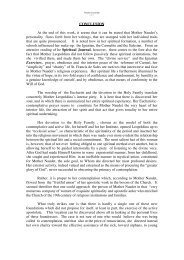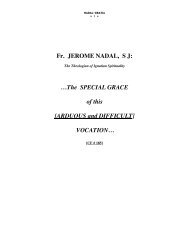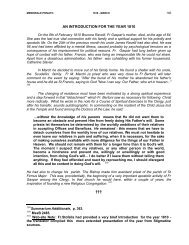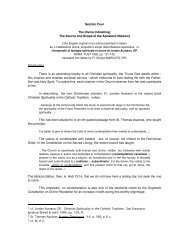[B.] St. IGNATIUS of LOYOLA Presentation: The ... - St. Gaspar Bertoni
[B.] St. IGNATIUS of LOYOLA Presentation: The ... - St. Gaspar Bertoni
[B.] St. IGNATIUS of LOYOLA Presentation: The ... - St. Gaspar Bertoni
You also want an ePaper? Increase the reach of your titles
YUMPU automatically turns print PDFs into web optimized ePapers that Google loves.
INTEGRE;SJ-OFM<br />
= 30 =<br />
further, these must be avoided even as far as the occasion is concerned. And this promotes<br />
merit, as something expedient for salvation.<br />
1812: Jesus is the Master <strong>of</strong> Perfection, and so to perfectly decline from the concupiscence <strong>of</strong><br />
the eyes, He counsels that all these temporal goods be left behind: If you wish to be perfect.<br />
Mt 19:21: to perfectly decline from the concupiscence <strong>of</strong> the flesh, He teaches that every<br />
experience, or concupiscence <strong>of</strong> the generative faulty, be totally avoided, Mt 19:12: …For there<br />
are eunuchs,, who have made themselves eunuchs for the kingdom <strong>of</strong> heaven. He that can<br />
take, let him take it… To perfectly decline from the pride <strong>of</strong> life, He suggests that the will be<br />
denied, Mtr 16:24: If any man will come after me, let him deny himself…<br />
In this three-fold supererogatory declination <strong>of</strong> the three-fold origin <strong>of</strong> all evil, consists the<br />
first part <strong>of</strong> evangelical perfection. This is what Sacred Scripture insinuates, and the authentic<br />
Doctors teach, and the Holy Fathers, the instructors <strong>of</strong> religion affirm.<br />
[a. <strong>The</strong> First Part <strong>of</strong> Perfection] 16<br />
1813: <strong>The</strong> first part <strong>of</strong> perfection, then, is to decline from evil: charity is to be <strong>of</strong> a pure heart.<br />
Every sin draws its origin from the disordered conversion to a three-fold commutable<br />
good, i.e., external, inferior and interior, according to the concupiscence <strong>of</strong> the eyes, <strong>of</strong> the flesh,<br />
and the pride <strong>of</strong> life. And these three realities must be rejected totally, and not only as regards<br />
their act or consent to them, as this can be done by the exercise <strong>of</strong> the opposite virtues. Further,<br />
these must all be avoided even as far as their occasion is concerned, and this further promotes<br />
the merit and becomes an expedient to salvation.<br />
Dt 18:13: You shall be perfect, and without spot before the Lord your God…<br />
Prosper, in his Concerning the Contemplative Life, noted: that the perfect are those who will<br />
what God wills, and they acquiesce in no sins by which He is <strong>of</strong>fended.<br />
1814: <strong>St</strong>. Francis was perfect in this manner, also while still living in this world, even before he<br />
knew <strong>of</strong> his own vocation It happened that while he was wasting time with vane friends,<br />
immersed in vanities, and in his youth, he would never take hold <strong>of</strong> thee vices, and he would not<br />
even desire those delights that were any less than innocent. He fled the companionship <strong>of</strong> the<br />
lascivious, those wanton sinners, and the vain. He was born rich, and situated by his father in the<br />
business world, he began to appreciate wealth. However, he did not place his hope in money, nor<br />
in the treasure <strong>of</strong> this world. Humility and meekness were the adornment <strong>of</strong> his beautiful customs.<br />
This is perfection, but only according to the precepts. You will be perfect…, etc. Dt 18;13.<br />
1815: But Jesus is the Master <strong>of</strong> Perfection, and in order to decline perfectly from the<br />
concupiscence <strong>of</strong> the eyes, which is avarice, He counsels that all these temporal goods be left<br />
behind. Mt 19:21: If you wish to be perfect, go, sell what you have…<br />
And <strong>of</strong> that other young man he never paid much attention to the fact that he had been<br />
born rich, as he was, and he was committed by his father into buying and selling, and understood<br />
what was needed to make a pr<strong>of</strong>it. Did he ever, though, place any hope ever in gold, which is so<br />
highly thought <strong>of</strong> on the part <strong>of</strong> other men<br />
1816: Rather, Francis was also quite liberal in his use <strong>of</strong> it, and very generous toward all. He<br />
also became a very merciful benefactor with the poor, even to the point <strong>of</strong> thinking that he had<br />
done very little penance at the request <strong>of</strong> one, and came to tears over having given but little,<br />
once being distracted as he was by so many business matters. <strong>The</strong>n, he actually ran after that<br />
beggar, and fell at his feet, and warmly asked him to kindly pardon him. <strong>The</strong>n, beyond what the<br />
poor man had hoped, and beyond what was his need, the saint made very liberal provision for<br />
him. And he was not even content with all this and so, from that time on, he obliged himself<br />
16 NB: With this paragraph, Fr. <strong>Bertoni</strong>’s basic text shifts from Latin to what seems to be antiquated Italian.<br />
[copied]


![[B.] St. IGNATIUS of LOYOLA Presentation: The ... - St. Gaspar Bertoni](https://img.yumpu.com/33393889/30/500x640/b-st-ignatius-of-loyola-presentation-the-st-gaspar-bertoni.jpg)













